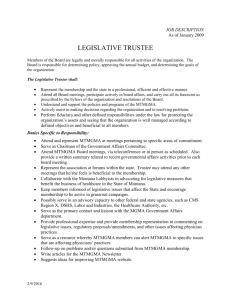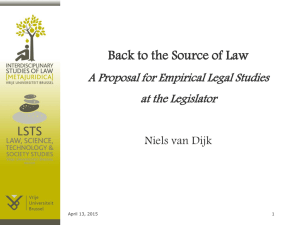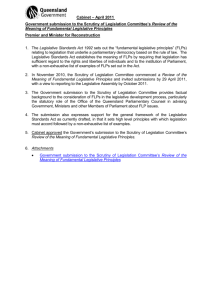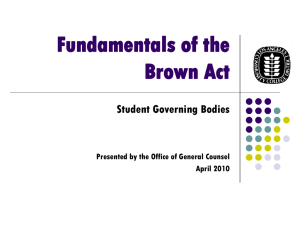Brown Act Requirements Regarding Committee Meetings October
advertisement
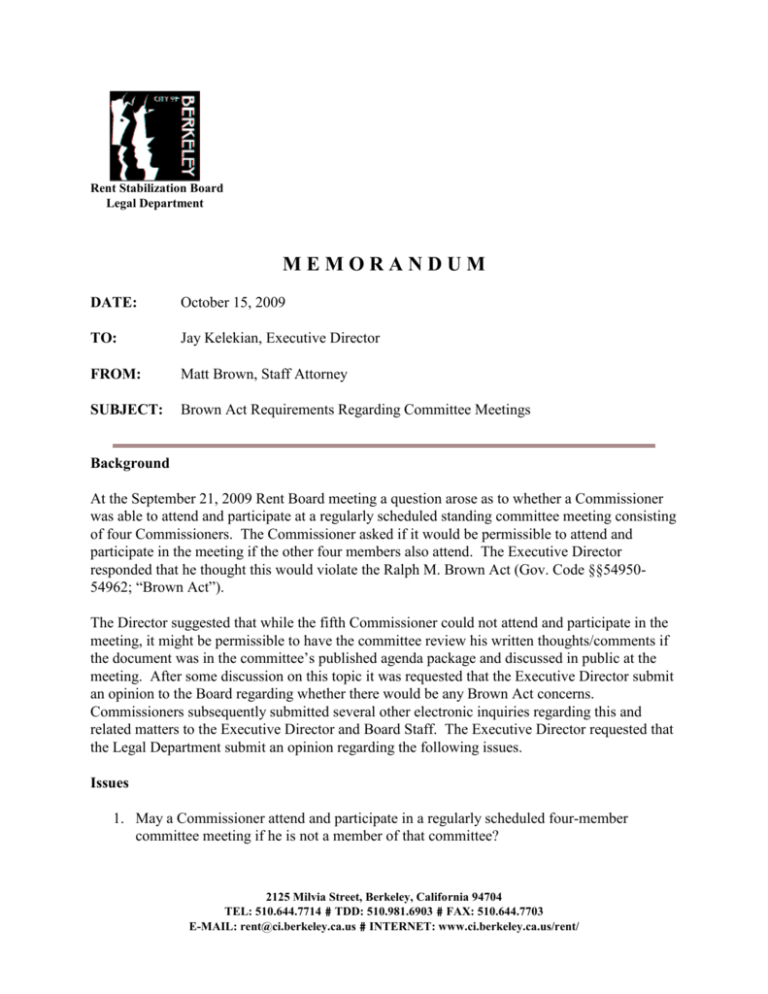
Rent Stabilization Board Legal Department MEMORANDUM DATE: October 15, 2009 TO: Jay Kelekian, Executive Director FROM: Matt Brown, Staff Attorney SUBJECT: Brown Act Requirements Regarding Committee Meetings Background At the September 21, 2009 Rent Board meeting a question arose as to whether a Commissioner was able to attend and participate at a regularly scheduled standing committee meeting consisting of four Commissioners. The Commissioner asked if it would be permissible to attend and participate in the meeting if the other four members also attend. The Executive Director responded that he thought this would violate the Ralph M. Brown Act (Gov. Code §§5495054962; “Brown Act”). The Director suggested that while the fifth Commissioner could not attend and participate in the meeting, it might be permissible to have the committee review his written thoughts/comments if the document was in the committee’s published agenda package and discussed in public at the meeting. After some discussion on this topic it was requested that the Executive Director submit an opinion to the Board regarding whether there would be any Brown Act concerns. Commissioners subsequently submitted several other electronic inquiries regarding this and related matters to the Executive Director and Board Staff. The Executive Director requested that the Legal Department submit an opinion regarding the following issues. Issues 1. May a Commissioner attend and participate in a regularly scheduled four-member committee meeting if he is not a member of that committee? 2125 Milvia Street, Berkeley, California 94704 TEL: 510.644.7714 # TDD: 510.981.6903 # FAX: 510.644.7703 E-MAIL: rent@ci.berkeley.ca.us # INTERNET: www.ci.berkeley.ca.us/rent/ Brown Act Requirements Regarding Committee Meetings October 15, 2009 Page 2 2. May a Commissioner who is not a member of a standing committee send a memorandum to another Commissioner who is a member of the standing committee for the purpose of including the memorandum in the agenda at the committee meeting and discussing its contents? Conclusions 1. The participation by a Commissioner not a member of the committee in a regularly scheduled committee meeting would violate the notice, agenda, and public participation requirements of the Brown Act. 2. A Commissioner who is not a member of a standing four-member committee may not send a memorandum to that committee to be considered and discussed by the other members of the committee as this may develop a concurrence as to action to be taken and would violate the Brown Act. Analysis 1. The first inquiry concerns whether a fifth Commissioner may attend and participate in a publicly noticed committee meeting consisting of less than a quorum of the Board without violating the notice, agenda, and public participation requirements applicable to meetings of the full Board. The purpose of the Brown Act, which is the “open meeting” law applicable to local government agencies, is set forth in Government Code section 54950 as follows: “In enacting this chapter, the Legislature finds and declares that the public commissions, boards and councils and the other public agencies in this State exist to aid in the conduct of the people's business. It is the intent of the law that their actions be taken openly and that their deliberations be conducted openly. The people of this State do not yield their sovereignty to the agencies which serve them. The people, in delegating authority, do not give their public servants the right to decide what is good for the people to know and what is not good for them to know. The people insist on remaining informed so that they may retain control over the instruments they have created.” Thus, to promote open government, the Brown Act requires that “all meetings of the legislative body of a local agency be open and public, and all persons shall be permitted to attend any meeting of the legislative body of a local agency except as otherwise provided in this chapter.” (Gov. Code §54953(a).) The Rent Board, being a commission created by the Charter of the City Brown Act Requirements Regarding Committee Meetings October 15, 2009 Page 3 of Berkeley, is a “legislative body” of a “local agency.” (Gov. Code §54951 [“local agency” includes a “city … or any board, commission or agency thereof…”]; Gov. Code §54952 [“legislative body” includes “the governing body of a local agency” and a “commission, committee, board, or other body of a local agency … created by charter, ordinance, resolution, or formal action of a legislative body”].) Thus, under the Brown Act, all meetings of the Rent Board, including standing committee meetings, must be open and public unless otherwise provided in the Act. The Brown Act defines the term meeting to include “any congregation of a majority of the members of a legislative body at the same time and place to hear, discuss, or deliberate upon any item that is within the subject matter jurisdiction of the legislative body or the local agency to which it pertains.” (Gov. Code §54952.2(a).) Except for very specific exceptions, courts have held time and again that all meetings, including those of less than a quorum of the larger legislative body, must be open and publicly noticed. The Attorney General has considered the issue of whether a member may participate in a committee meeting if his attendance would cause a majority of the legislative body to be present. California Attorney General Opinion No. 95-614 states: “If a majority of the legislative body is allowed to be present at a subcommittee meeting held to consider items that presumably will appear on a future agenda of the legislative body, proper notice and public participation cannot be assured. An item may be resolved at the subcommittee meeting by a quorum of the members, with the action later taken at the legislative body’s own meeting constituting a mere “rubber stamp.” Although the subcommittee meeting would be noticed and open to the public, the public would not anticipate that items will be resolved at that meeting due to the less than a quorum composition of the subcommittee. Members of the public wishing to present their views when the item is to be decided will attend the legislative body’s meeting only to find that the decision has in effect already been made. The public will effectively be denied the right to present views prior to the legislative body’s actual determination. Such result would undermine the Legislature’s purposes in requiring notice, a posted agenda, and public participation prior to the resolution of a matter by a legislative body.” A fifth Commissioner’s attendance and participation at a four-member committee meeting would thus result in a violation of the notice, agenda, and public participation requirements for meetings held by the parent legislative body. While a Commissioner may attend a standing committee meeting as an observer, he may not participate or otherwise comment on the items discussed at the meeting. (Gov. Code §54952.2(c)(6).) 2. The second inquiry is slightly more complicated. The Brown Act expressly prohibits serial meetings that are conducted through “any use of direct communication, personal intermediaries, Brown Act Requirements Regarding Committee Meetings October 15, 2009 Page 4 or technological devices that is employed by a majority of the members of the legislative body to develop a collective concurrence as to action to be taken on an item by the members of the legislative body . . .” (Gov. Code §54952.2(b); Stockton Newspapers, Inc. v. Redevelopment Agency (1985) 171 Cal.App.3d 95, 103 [emphasis added].) “Action taken” is defined as “a collective decision made by a majority of the members of a legislative body, a collective commitment or promise by a majority of the members of a legislative body to make a positive or a negative decision, or an actual vote by a majority of the members of a legislative body when sitting as a body or entity, upon a motion, proposal, resolution, order or ordinance.” (Gov. Code §54952.6.) The Attorney General elaborates further regarding the prohibition on serial communications on page 11 of its 2003 booklet entitled “The Brown Act – Open Meetings for Local Legislative Bodies”: “Typically, a serial meeting is a series of communications, each of which involves less than a quorum of the legislative body, but which taken as a whole involves a majority of the body’s members. For example, a chain of communications involving contact from member A to member B who then communicates with member C would constitute a serial meeting in the case of a five-person body. Similarly, when a person acts as the hub of a wheel (member A) and communicates individually with the various spokes (members B and C), a serial meeting has occurred.” Nevertheless, the serial communications must be used to develop a concurrence as to the action to be taken for the communications to be considered a violation of the Brown Act. The Stockton Newspapers, Inc. case again provides guidance. The court determined that the Brown Act: “ . . . [c]ontemplates that the part of the governing body constituting less than a quorum ‘will report back to the parent body where there will then be a full opportunity for public discussion of matters not already considered by the full board or a quorum thereof.’ Such is not the case where a number of the members sufficient to constitute a quorum of the legislative body has already been informed and deliberated, albeit serially, on a matter of public business by the time the matter reaches the stage of public discussion.” (Stockton Newspapers, Inc., at pp. 102-103.) Again, it is important to consider the purpose of the Brown Act when determining whether a course of action may violate it. California Attorney General Opinion No. 95-614 clarifies that “The courts will thus carefully scrutinize the particulars of each situation and invalidate an attempt to evade the purposes of the Act.” Staff recommends exercising extreme caution when dealing with matters that could be interpreted to violate the open meeting requirements of the Brown Act. In determining whether the Commissioner not a member of the committee may send a memorandum to a member of the four-member committee, we must consider the purpose of the memorandum itself. The memorandum is an attempt by the non-member to share his thoughts/comments on matters the committee will review before presenting its position to the full Brown Act Requirements Regarding Committee Meetings October 15, 2009 Page 5 Board. As such, it is problematic. Indeed, the Attorney General’s booklet entitled “The Brown Act – Open Meetings for Local Legislative Bodies” notes on page 12 that “[p]roblems arise when systematic communications begin to occur which involve members of the board acquiring substantive information for an upcoming meeting or engaging in debate, discussion, lobbying or any other aspect of the deliberative process either among themselves or with staff.” A memorandum that expounds upon a non-committee member’s thoughts and comments on matters that the committee is considering certainly qualifies as “communication” for the purpose of “discussing, lobbying or [some] other aspect of the deliberative process.” As such, it would certainly be dangerous to allow this communication to proceed as it may be considered a serial communication for the purpose of developing a concurrence as to action to be taken. Nevertheless, given the complexity of this issue, legal staff phoned an attorney at the Attorney General’s Office, an expert on open government and the Brown Act. The attorney noted that the submission of the memorandum would be problematic given that the Brown Act specifically allows attendance of a majority of members of a legislative body only if the members of the legislative body who are not members of the standing committee attend only as observers. (Gov. Code §54952.2(c)(6).) The attorney further reasoned that the submission of the memorandum would subvert the spirit of the prohibition against participation for all Commissioners who are not members of the standing committee since the submission of the memorandum goes beyond mere observation of the committee meeting. Moreover, Courts have further limited communications even when no formal action is taken, determining that the decision-making process consists of both “actions” and “deliberations” which must respectively be taken and conducted “openly”. Courts have held that the concept of meeting comprehends both action and deliberation. “Since deliberation connotes not only collective discussion but also the ‘collective acquisition and exchange of facts preliminary to the ultimate decision,’ the Brown Act is applicable to collective investigation and consideration short of official action.” Sacramento Newspaper Guild V. Sacramento County Bd. Of Suprs. (1968) 263 Cal.App.2d 41, 47-49; see also Rowen v. Santa Clara Unified School Dist. (1981) 121 Cal.App.3d 231, 234. No official action need be taken, then, for a Brown Act violation to occur. Courts have determined that even deliberation by a majority of the legislative body on matters that would otherwise come before the entire legislative body would be prohibited. Submission of the memorandum to the committee by a non-member of the committee would most likely violate the Brown Act and may result in invalidation of actions taken and, in certain circumstances, lead to civil and criminal penalties. (Gov. Code §§54959, 54960, 54960.1, 54960.5.) Alternative avenues may be taken, however, to disseminate the Commissioner’s thoughts on the matters discussed in the memorandum and still remain within the letter and spirit of the Brown Act. The Commissioner would be entitled to submit the memorandum to the full Board and have it included on the agenda and publicly noticed. S/he would then be able to fully discuss the matters he requests that the committee consider without violating the notice, agenda, and public Brown Act Requirements Regarding Committee Meetings October 15, 2009 Page 6 participation requirements applicable to meetings of the full Board. Even if there is no discussion by the full Board, the item could be referred to the appropriate committee where all perspectives (including those of the memorandum) could be considered. The Board may also wish to consider reconstituting its standing committees to include three members per committee instead of four. This would allow for Commissioners who are interested in specific matters to participate in committee meetings even if they are not members of the standing committee so long as the total number of active participants does not constitute a majority of the Board. Nevertheless, this option does not come without some potential hazards. Staff would be happy to elaborate should the Board request further information.
